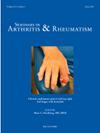纯合子M694V MEFV基因型FMF的非典型表现:来自大型患者队列的见解
IF 4.4
2区 医学
Q1 RHEUMATOLOGY
引用次数: 0
摘要
目的纯合子M694V基因型与最严重的家族性地中海热(FMF)有关。本研究旨在探讨该基因型是否不仅与经典FMF特征有关,还与其他非典型表现有关。方法采用自动算法提取2010 - 2020年在Sheba医疗中心FMF诊所随访的患者结构化病历数据,进行假设生成研究。将M694V基因型纯合子患者(研究组)与其他基因型患者(对照组)进行比较。结果3866例患者中,M694V纯合突变517例(13.4%),其他基因型3349例(86.6%)。纯合子M694V患者需要更高的秋水仙碱剂量,并表现出更高的炎症标志物、秋水仙碱治疗失败、Behcet病(BD)、强直性脊柱炎(AS)和慢性肾衰竭(CRF)的发生率(p < 0.01)。新的发现包括更高的深静脉血栓发生率(p = 0.03),肝功能障碍(p = 0.02),肝酶异常(p < 0.001)和充血性心力衰竭(p = 0.01)。因此,研究组中接受生物制剂治疗的患者较多,急诊科就诊次数较多,住院率较高(两者均p≤0.001)。本研究通过发现新的非典型特征和在更大范围内强化先前的知识,扩大了纯合子m694v相关表型的范围。我们假设全身性炎症的加剧可能是这些关联的基础。然而,需要进一步的探索来确定这些新发现是否确实归因于M694V纯合子基因型的高炎症性,或者是由FMF亚群中普遍存在的既定和新的条件介导的,如BD、as、CHF、CRF和较高的秋水草碱暴露。本文章由计算机程序翻译,如有差异,请以英文原文为准。
Non-canonical manifestations of FMF in homozygous M694V MEFV genotype: Insights from a large patient cohort
Objectives
The homozygous M694V genotype is associated with the most severe form of familial Mediterranean fever (FMF). This study aims to explore whether this genotype is linked not only to classical FMF features, but also to additional, non-canonical manifestations.
Methods
A hypothesis-generating study was conducted using an automated algorithm to extract data from structured medical records of patients followed at the FMF clinic of Sheba Medical Center between 2010 and 2020. Patients homozygous for the M694V genotype (study group) were compared with those having other genotypes (control group).
Results
Of 3866 patients, 517 (13.4 %) were homozygous for the M694V mutation, while 3349 (86.6 %) had other genotypes. Homozygous M694V patients required higher colchicine doses and exhibited higher rates of inflammatory markers, colchicine treatment failure, Behcet's disease (BD), ankylosing spondylitis (AS), and chronic renal failure (CRF, in all p < 0.01). New findings included higher rates of deep vein thrombosis (p = 0.03), liver dysfunction (p = 0.02), abnormal liver enzymes (p < 0.001), and congestive heart failure (CHF, p = 0.01). Consequently, more patients in the study group received biologic agents and had more emergency department visits and higher hospitalization rates (p ≤ 0.001 in both).
Conclusions
This study expands the scope of the homozygous M694V-associated phenotype by identifying new non-canonical features and reinforcing previous knowledge on a larger scale. We hypothesized that heightened systemic inflammation may underlie many of these associations. However, further exploration is needed to determine whether these novel findings are indeed attributed to the higher inflammatory nature of the M694V homozygous genotype, or is mediated by established and novel conditions prevailing in this subset of FMF, such as BD, AS, CHF, CRF, and higher colchicine exposure.
求助全文
通过发布文献求助,成功后即可免费获取论文全文。
去求助
来源期刊
CiteScore
9.20
自引率
4.00%
发文量
176
审稿时长
46 days
期刊介绍:
Seminars in Arthritis and Rheumatism provides access to the highest-quality clinical, therapeutic and translational research about arthritis, rheumatology and musculoskeletal disorders that affect the joints and connective tissue. Each bimonthly issue includes articles giving you the latest diagnostic criteria, consensus statements, systematic reviews and meta-analyses as well as clinical and translational research studies. Read this journal for the latest groundbreaking research and to gain insights from scientists and clinicians on the management and treatment of musculoskeletal and autoimmune rheumatologic diseases. The journal is of interest to rheumatologists, orthopedic surgeons, internal medicine physicians, immunologists and specialists in bone and mineral metabolism.

 求助内容:
求助内容: 应助结果提醒方式:
应助结果提醒方式:


